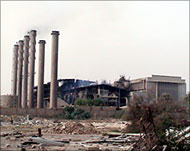Bureaucracy bogs down Baghdad
How many people does it take to run a ministry?

In Baghdad, it seems, one to make a decision – and a thousand to prevent anyone else from finding out what it is.
The same goes for traffic.
Despite having the luxury of four traffic police at one junction, one decides what should happen and the other three confuse the situation. All four directions can and do proceed at the same time.
Searching out some basic information like how much electricity was required in Iraq, and how much was produced, is no less an ordeal – if you make it through the traffic.
Ministry of Electricity
Sitting in a flyblown office with tobacco-stained walls, Ahmad Sabah was clearly a seasoned red-taper.
“You can’t see the minister or any other official unless you have permission from the Governing Council. No, I cannot ask him if he will spare you five minutes, I have written orders.”
Sabah produced a handwritten note from his pocket, sweat-stained and in illegible letters.
“No, the ministry cannot produce figures about electricity production unless you have a signed note from the Governing Council. Get that and come back tomorrow.”
It was just as well he said tomorrow Crossing Baghdad’s central Sahat al-Tayran takes two hours. People just abandon their cars in the middle of the street to do their shopping while they wait for the traffic to move.
Some scream and shout, others read, but most shop as they wait for any sign of movement.
Rejection
The Governing Council administration was to be equally unhelpful. Falling at the first hurdle, a US soldier told me he was under the impression Aljazeera was banned in Iraq.
 |
|
Shop while you stop: Frustrated |
“No. We’re just banned temporarily from covering Iraq’s Governing Council.”
Refusal to see the minister of electricity or even the humblest of engineers came swiftly and expectedly.
Driving to southern Baghdad’s power generating stations, the Maaskar Rashid plant, I made one last attempt to get some basic information.
A teenage US soldier with a thick Mexican accent asked if I had a letter from the ministry. “Of course”, I said, showing him a completely unrelated letter in Arabic.
“Don’t take any pictures of anything”, he said, letting me through the razor wire.
Ageing power plant
Once the soldier had allowed entry, it was easy passing through the rest of the formalities. Eventually, I reached the general manager’s office.
Three ancient telephones and a stack of ageing folders dated 1958 until 1979 hinted nostalgically at busier times. General Manager Bashir Kalaf was soon offering me some tea.
His power plant is one of four around Baghdad and was built in 1958, initially with German equipment.
But by 1973, it was completely rebuilt with equipment from the American company General Electrical. In fact, Kalaf’s station was the only one to use American machinery. Other stations used Russian, German and Italian equipment – nearly all it in need of replacement.
Sanctions had prevented him from keeping the station at full capacity – it was designed to make 350 megawatts, but Kalaf said he still dare not make more than 200 – and “that’s pushing it”.
“Now the sanctions are over, we are again asking the government for spare parts. But the problem is that the company is not making parts that are usually older than 30 years.”
Rumours
Kalaf said that the Dawra station was in better shape and that spare parts and engineers from Siemens had arrived soon after the end of the invasion in April.
 |
|
Dawra power station: Cloaked in |
“But I’ve heard the Americans are refusing to install German equipment that is already in Iraq, preferring that spare parts are made to order in the US.”
The 60-year-old manager also made it clear he “had only heard rumours” and was not “100% sure”.
“Feel free to take photographs”, he added, as I stood up to leave, “but don’t let the Americans see.”
Unfortunately, the Dawra station had far more US military and Iraqi police. No official was prepared to talk about production or the rumours of desperately needed – but discarded – spare parts.
Coming ‘dependence’
However, one engineer who had just come off shift, Abu Muhammad, said all kinds of baseless accusations are being raised in an attempt to prevent Iraqi engineers from installing German spare parts that are just sitting in crates collecting dust.
“They say the equipment is poor quality and hard to maintain. We think it is just an attempt to make Baghdad depend on America for its infrastructure. But as long as I keep my job, I don’t care.”
On another two-hour journey back home, punctuated by two stop and searches, my taxi driver told me everyone had heard this rumour ages ago.
Everyone, it seems, but the outside world.
Answers
Telephoning the US-led occupation administration – the so-called Coalition Provisional Authority – was a last desperate attempt to find out what I wanted to know.
The Texan official on the phone asked what was needed, put me on hold and came back with the facts.
Post-war generation capacity is around 2000 megawatts in the whole of Iraq.
This compares to 5000 megawatts before the war. Iraq will need at least 6000 megawatts within three years. These estimates come from USAID.
“No one here is qualified to talk about Dawra, you could try the ministry. Have a nice day.”